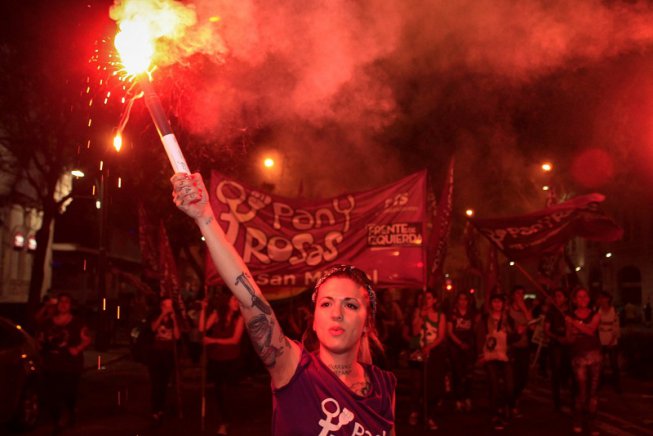In the past few days, Argentina has been shaken by a series of violent acts perpetrated against women, including eight femicides in the past week. Lucía Pérez, a 16-year-old student from the city of Mar del Plata was brutally raped, tortured and murdered. Marcela Crelz was murdered for being a lesbian. Another woman was strangled and left in a cardboard box in the district of Matanza, Buenos Aires. In the province of Mendoza, a woman was raped and, having called for help, was again sexually assaulted. In the district of La Boca, two girls age 15 and 18 were stabbed. In the province of Córdoba, Natalia Padilla and Samantha Yoerg were murdered by their partners. The list goes on; a woman is murdered every 28 hours in Argentina.
Argentine women participated in massive protests against gender violence on June 2, 2015 and 2016 under the slogan “#NiUnaMenos” (not one less). Just a week ago the country’s 31st National Women’s Conference brought together thousands of women from around the country to discuss how to move forward in the struggle for our rights. After the conference and following the recent succession of horrific acts of violence against women, 250 organizations met last Thursday in the city of Buenos Aires to prepare for a massive protest on October 19.
The Historic National Women’s Conference
From October 8 to 10, 70,000 women from across Argentina and neighboring countries came together in the city of Rosario to discuss the issues affecting women today. This was the 31st annual Conference of its kind and included over 200 workshops on topics such as abortion, sex trafficking, migrant women, women in the labor movement, political parties, trans rights, women and the media, women and human rights, black women, sex work and women and marijuana, among others. The first two days were full of workshops. At the end of the second day there was a massive march. On the third day resolutions were voted.
The workshops on women and sex trafficking were among the largest; over 300 women participated. Some participants included the relatives of sex trafficking victims who denounced the complicity of government officials and the police who are in the business of sexually exploiting women.
One of the new workshops at the Conference was on women and marijuana, which had to be divided into three groups because of the high number of participants.
The workshop on women and labor included delegations from some of the most combative sectors of the labor movement– workers who have been on strike, workers who have taken over factories and workers who have fought against layoffs and government cuts. Participants denounced the prevalent gender-based wage gap – which in some cases is as large as 30% – and spoke out against sexual harassment by bosses and supervisors. The delegations from Madygraf and Zanon, two companies under workers’ control, proposed a massive campaign to support companies that have been taken over by their workers.
In the workshop on trans women’s’ rights, the fight against violence and for workplace inclusion were at the centerplace and reflected the daily struggles of thousands of trans people in Argentina. Many spoke in support of the trans workers quota, demanding that 3% of all public employment be given to trans people.
At the end of two days full of workshops, thousands of women took over the streets of Rosario demanding their rights. For the first time, as a result of a battle waged by groups such as Pan y Rosas, the march passed by the city Cathedral to denounce the Church. In Argentina, Catholicism is the official religion and the church has great influence in politics. The Catholic Church is fiercely opposed to many of the women’s rights demanded in these Conferences.
The march stretched for over 40 blocks, including large columns of the Frente de Izquierda (Workers’ Left Front). In particular, Pan y Rosas and the PTS (Socialist Worker’s Party) brought a delegation of 4,000 women who fight for women’s rights and against the capitalist system. This delegation was one of the largest in the Conference.
Upon arriving at the Cathedral, women were attacked by the police of the province of Santa Fe. This province is governed by the Socialist Party, which is socialist in name only and allowed their police to attack women who were marching for their rights. Some reporters and protesters were hurt during the confrontation. The police’s actions had clearly been prepared beforehand as police forces had been waiting inside the Cathedral for hours.
At the end of the conference, a conflict broke out among the participants around the methods for choosing the venue for the next Conference. Although the majority of the participants decided during the workshops that the next venue would be the city of Buenos Aires, their decision was rejected by a sector of the Organizing Committee, led by the PCR (the Maoist “Revolutionary Communist Party”) and Patria Grande (a populist group). These groups imposed Chaco ,a small city in the North of Argentina as next year’s venue for the conference.
The Struggle against Gender Violence
One of the most important debates that took place during the Conference was the discussion on gender violence and femicide.This continues to be a major issue and has been met with the complete indifference and inaction of the State.
In the face of recent attacks against women around the country, organizers of the #NiUnaMenos movement have called for protests and work stoppages on October 19 under the slogan #NosotrasParamos #NiUnaMenos #VivasNosQueremos (We are striking. Not one less. We want to stay alive). The day will start off with a women’s strike, with people walking off the job, taking the street and blocking the roads from 1:00 to 2:00 p.m. In Buenos Aires, the protest will continue at 5:00 p.m. with a march from the city’s Obelisk to the Plaza de Mayo in front of the House of Government. There are protests planned for several other cities around the country.
The women of Pan y Rosas and the PTS believe that in order to wage a serious fight against femicide and gender violence we need to expand and strengthen our organization. We support each and every action organized to defend women’s rights and demand that the bill for a National Emergency Plan against Gender Violence be immediately debated and enacted, which would include creating shelters for survivors of violence and paid time off work for those leaving an abusive partner. Because we want to advance women’s organization we call for the creation of women’s committees in workplaces and schools. In preparation for October 19, we propose the creation of grassroots committees in every school throughout the country to organize teachers and workers along with students and parents, so that we can bring together the forces of the entire educational community to demand an end to gender violence. We call for similar organizations at workplaces and factories.
The mass #NiUnaMenos (Not One Less) protests of June 3, 2015 and 2016 were a watershed moment in Argentina. Millions of women, men, children and teenagers gathered to demand that the government, justice system and National Congress take urgent steps to put a stop to femicide and gender violence. However, this demand has gone unheard and neither the previous nor current government has taken any actions to deal with these important issues. We must trust our own strength in the struggle against the brutality of femicide and gender violence. We must take to the streets by the hundreds of thousands to denounce this violence and demand immediate action from State institutions. We must organize at our workplaces and schools in order to engage in work stoppages until the deaths of thousands of women is addressed.











